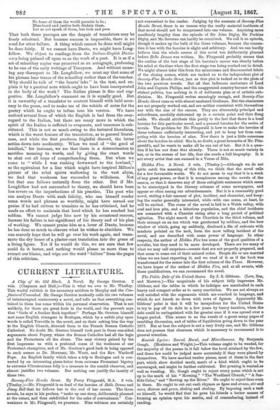Seventy - Five Brooke Street. By Percy Fitzgerald, M.A. 2 vols. (Tinsley.)—Mr.
Fitzgerald is so fond of the heroine of Bella Donna and Jenny Ben that he follows her to the end of her career. The three novels, he says in his preface, " make up one story, deliberately planned at the outset, and thus subdivided for the sake of convenience." Con- venience to Mr. Fitzgerald, we presume. Nine volumes are certainly. not convenient to the reader. Judging by the contents of Seventy-Five Brooke Street, there is no reason why the really material incidents of that novel should not be compressed into one volume. Anything more needlessly lengthy than the episode of Sir John Digby, Sir Perkins Digby, and Mr. Severna can hardly be conceived. We call it an episode, though it makes up the bulk of the three volumes, because the connee- tion it has with the heroine is slight and arbitrary. And we can hardly believe that the whole course of this novel was deliberately planned before Bella Donna was written. Mr. Fitzgerald probably means that the outline of the last stage of his heroine's career was clearly before his mind at the time when the first stage was being worked out in detail. We might almost infer this from the minuteness and disconnected fabric of the closing scenes, which are tacked on to the independent plot of Seventy-Five Brooke Street, just as that plot is tacked on to the plots of the two previous novels. But all that ludicrous caricature of Lord John and Captain Philips, and the exaggerated country baronet with his violent politics, has nothing in it of deliberate plan or of artistic sub- division. Mr. Fitzgerald writes amusingly enough, and Seventy-Five Brooke Street runs on with almost unabated liveliness. But the characters are not properly worked out, and are neither consistent with themselves nor with the size of the canvas. They are alternately principal and subordinate, carefully elaborated up to a certain point and then fling aside. We should attribute this partly to the fact that there is a local heroine for this particular novel, and a general heroine for the series- of novels. The problem for Mr. Fitzgerald is how to make the heroine of three volumes sufficiently interesting, and yet to keep her from com- peting with the heroine of nine. Now there is just a little sameness about the heroine-in-chief. She is, no doubt, a great favourite of Mr. Fitz,- gerald's, and he wants to make all he can out of her. But it is a ques- tion if he has not done that already. There is not so much variety in her, or in the scenes of her life, that she needs a full biography. It is not every artist that can succeed in a Venus of Milo.






























 Previous page
Previous page